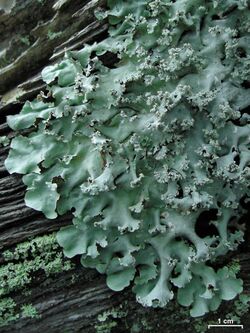Biology:Parmotrema gardneri
From HandWiki
Short description: Species of lichen
| Parmotrema gardneri | |
|---|---|

| |
| Scientific classification | |
| Domain: | Eukaryota |
| Kingdom: | Fungi |
| Division: | Ascomycota |
| Class: | Lecanoromycetes |
| Order: | Lecanorales |
| Family: | Parmeliaceae |
| Genus: | Parmotrema |
| Species: | P. gardneri
|
| Binomial name | |
| Parmotrema gardneri (C.W.Dodge) Sérus. (1984)
| |
| Synonyms[1] | |
| |
Parmotrema gardneri is a species of foliose lichen in the family Parmeliaceae. It was first formally described in 1955 by Carroll William Dodge as Parmelia gardneri, from specimens collected in Brazil.[2] Emmanuël Sérusiaux transferred it to the genus Parmotrema in 1984. In addition to South America, it is also found in Africa,[3] Asia,[4] and North America.[5]
See also
References
- ↑ "Synonymy: Parmotrema gardneri (C.W. Dodge) Sérus., Bryologist 87(1): 5 (1984)". Species Fungorum. http://www.speciesfungorum.org/Names/SynSpecies.asp?RecordID=107092.
- ↑ Dodge, C.W. (1959). "Some lichens of tropical Africa. III. Parmeliaceae". Annals of the Missouri Botanical Garden 46 (1–2): 179. doi:10.2307/2394567. https://www.biodiversitylibrary.org/part/27400.
- ↑ Sérusiaux, E. (1984). "Contribution to the study of lichens from Kivu (Zaire), Rwanda and Burundi. VIII. New and interesting species of parmeliaceous lichens". The Bryologist 87 (1): 1–11. doi:10.2307/3242875.
- ↑ Bawingan, Paulina A.; Lardizaval1, Mechell P.; Rosuman, Praxedes F.; Fajardo, Weenalei T.; Azuelo, Andrea; Elix, John A.; Hur, Jae-Seoun (2017). "Philippine Species of Parmotrema (Ascomycota, Parmeliaceae)". Philippine Journal of Science 146 (2): 145–158. https://philjournalsci.dost.gov.ph/images/pdf/pjs_pdf/vol146no2/Philippine_species_of_parmotrema.pdf.
- ↑ Lendemer, James C. (2009). "Contributions to the lichen flora of Pennsylvania. — Further new and interesting reports of lichens and lichenicolous fungi". Evansia 26 (3): 131–141. doi:10.1639/0747-9859-26.3.131.
Wikidata ☰ Q10620783 entry
 |

